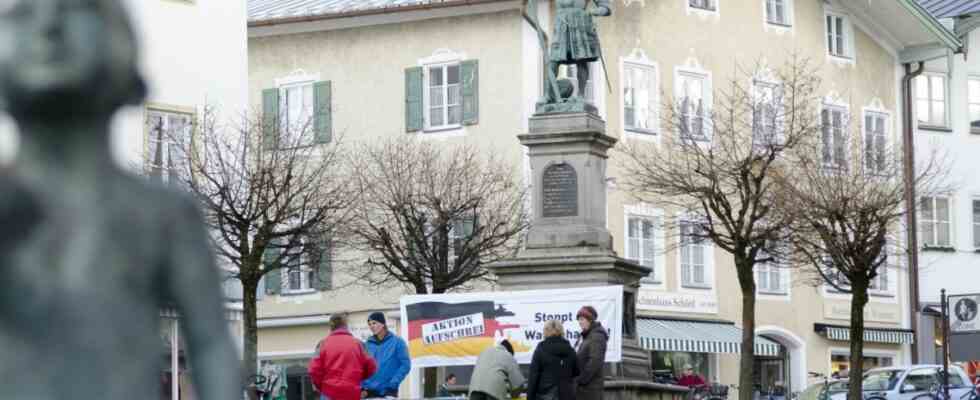The Bad Tölz-Wolfratshausen peace initiative has been around for a good 30 years. It was founded in February 1991 as a protest against the Gulf War. An event for this milestone birthday in November last year had to be canceled due to Corona. It was supposed to be a “festival with dancing and a samba group,” said spokesman Helmut Groß at a press event. But with the war in Ukraine, “we’ve run out of celebrations.” On Sunday, May 8th, there will be a slimmed-down anniversary event with a peace concert and a panel discussion between the two founding members and former members of the Bundestag, Klaus Barthel (SPD) and Andreas Wagner, who left the Left Party in December.
“The use of military force is a completely unsuitable means of permanently solving conflicts”: This is one of the core messages of the peace initiative, which currently has around 25 members in the district. Creating peace without weapons: For her, this includes disarmament and dialogue instead of deterrence, the long-term abolition of the Bundeswehr, as well as the rejection of NATO, which “has increasingly become a global player,” as Wagner explained. The peace initiative is correspondingly critical of Sweden and Finland joining NATO. “That won’t make the Russians feel safer,” Gross warned.
The fear of an escalation and a third world war is also driving the members of the peace initiative in an unprecedented way. In the face of the ongoing brutality of the war and Putin’s unpredictability, helplessness is growing and old certainties are beginning to falter. “We had our discussions,” said founding member Hans Gärtner. It needed a “clarification process”. The positions have remained the same: no arms deliveries to Ukraine because “this means putting out a fire with gasoline”, a return to the negotiating table and intensive efforts to reach a ceasefire – the district group summed it up in a statement in March. The peace initiative also rejects economic sanctions aimed at “ruining Russia” because this would only lead to further escalation. “Peace in Europe can only be achieved with and not against Russia”. That includes a recognition of “legitimate security interests of Russia”. Contacts in economic, scientific, cultural or sporting areas with the Russian population should not be severed.
In mid-April, the members reiterated their demands in a letter to the CSU constituency MP Alexander Radwan: against the 100 billion euro emergency program for the German armed forces and against armaments investments amounting to two percent of gross domestic product. The pressure from public opinion and the media has increased enormously, including from the Greens. The peace initiative is deeply concerned that the Bundestag voted by a large majority on April 28 in favor of the delivery of heavy weapons and that Ukrainian soldiers should be trained in Germany. Gärtner refers to a report by the Bundestag’s scientific service, according to which Germany would “leave the secured area of non-warfare” in the case of arms deliveries and the training of Ukrainian soldiers. In the current social climate, as a peace activist, one is quickly pigeonholed as a “Putin understander.” In any case, he “didn’t find the peace demonstrations in Munich shortly after the beginning of the war so peaceful,” said the Social Democrat. As a member of the peace movement, you have already been approached: “What do you want now, we have to hit it.”
Helmut Groß, spokesman for the Bad Tölz-Wolfratshausen peace initiative.
(Photo: Manfred Neubauer)
The district group has repeatedly positioned itself over the past decades with campaigns, signature lists and open letters: in 1991 against the war in Iraq, in 1999 against the Kosovo war with German participation. She filed criminal charges against the then government under Chancellor Gerhard Schröder on the grounds that there was no UN mandate for the bombing of Kosovo with NATO aircraft. In addition, uranium ammunition was fired, and the UN Human Rights Commission has been campaigning for its ban ever since. On the anniversary of the NATO attack, the association organized a 20-minute blockade of the Isar Bridge on March 24, 2000, as a symbolic reference to the 60 bridges that had been bombed during the war in Yugoslavia. In 1999, the group wrote an open letter to the Russian ambassador in Berlin, demanding that the attacks in Chechnya be stopped. The peace initiative meant that Geretsried and Bad Tölz are members of the “Mayors for Peace – Mayors for Peace” campaign, which also campaigns for the abolition of nuclear weapons. A hospital in Chak, Afghanistan, has been supported since 2001, Groß explained, as well as the campaign “Holidays in War”: Children and young people from war zones are invited to a holiday camp “in the spirit of reconciliation”.
The anniversary event in the Geltinger Ambush will take place on Sunday, May 8th. At 11 a.m. there will be a panel discussion, followed by a peace concert with the duo “Zeitreise”. The event is free. Donations go to the “Ukrainehilfe Kochel” helpers’ group and to the hospital in Chak.

